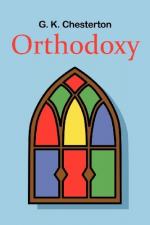
|
| Name: _________________________ | Period: ___________________ |
This quiz consists of 5 multiple choice and 5 short answer questions through Chapter VII: The Eternal Revolution.
Multiple Choice Questions
1. What conclusion does the complete skeptic eventually reach?
(a) He has no right to think for himself.
(b) No one else can think for him.
(c) There are no answers to be found.
(d) He will never find the answers.
2. What is the "false theory of progress?" (Chesterton 2000, pg. 196)
(a) Defining man's progress in terms of religion.
(b) Tracking man's progress poorly.
(c) Confusing people with too much data.
(d) Changing the standards rather than becoming better.
3. Who does Chesterton name as believers in the Inner Light?
(a) The people who hated Marcus Aurelius.
(b) The early Christians.
(c) The idealists and pantheists.
(d) The last Stoics and the Quakers.
4. Chesterton names four standards by which people try to establish the ideals of equality and inequality. What is the first?
(a) Persuasive thinking, similar to Nietzsche's.
(b) The passage of time.
(c) God-given authority.
(d) The progression of creatures through evolution.
5. Why did the serious changes in our political outlook occur at the beginning of the nineteenth century rather than at the end?
(a) At the end, men began to believe wholeheartedly in certain things.
(b) At the beginning, intellectualism was more highly encouraged.
(c) At the end, men were caught up in religious questions.
(d) At the beginning, men still believed fixedly in certain things.
Short Answer Questions
1. In Chesterton's image, how did he feel once his religious opinion changed? (Chesterton 2000, pg. 235)
2. What does Chesterton assert as a necessity for the human mind?
3. According to Chesterton, what mindset, paralleling patriotism, leads to reform?
4. What does evolution destroy, according to Chesterton?
5. Why does Chesterton say that any discussion about the creation/sustaining principle in the world must be metaphorical?
|
This section contains 345 words (approx. 2 pages at 300 words per page) |

|




